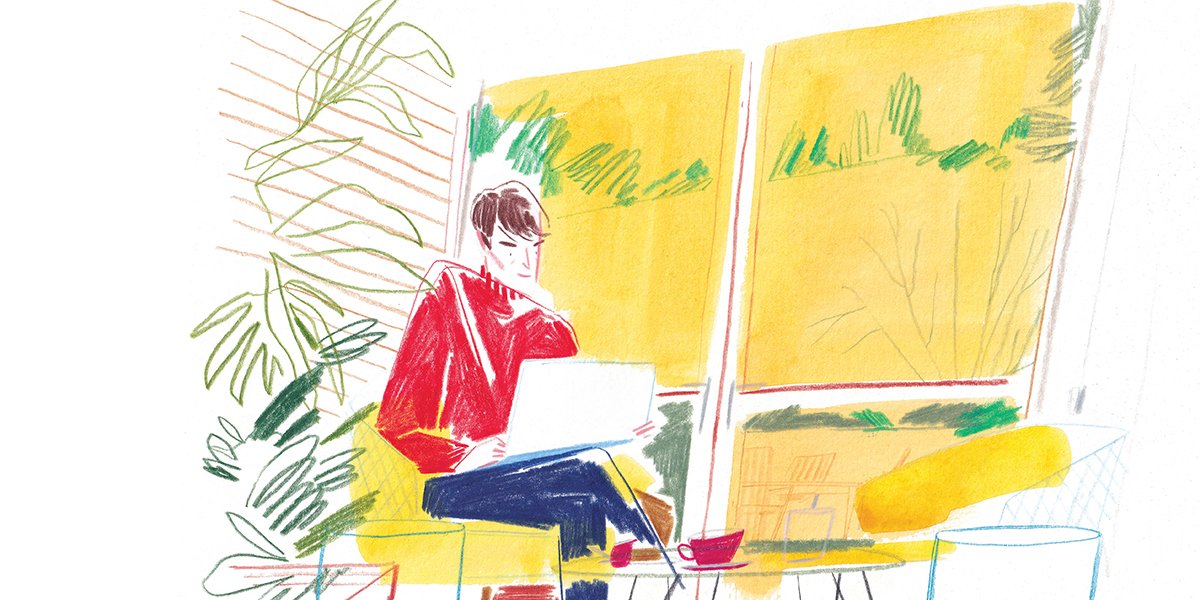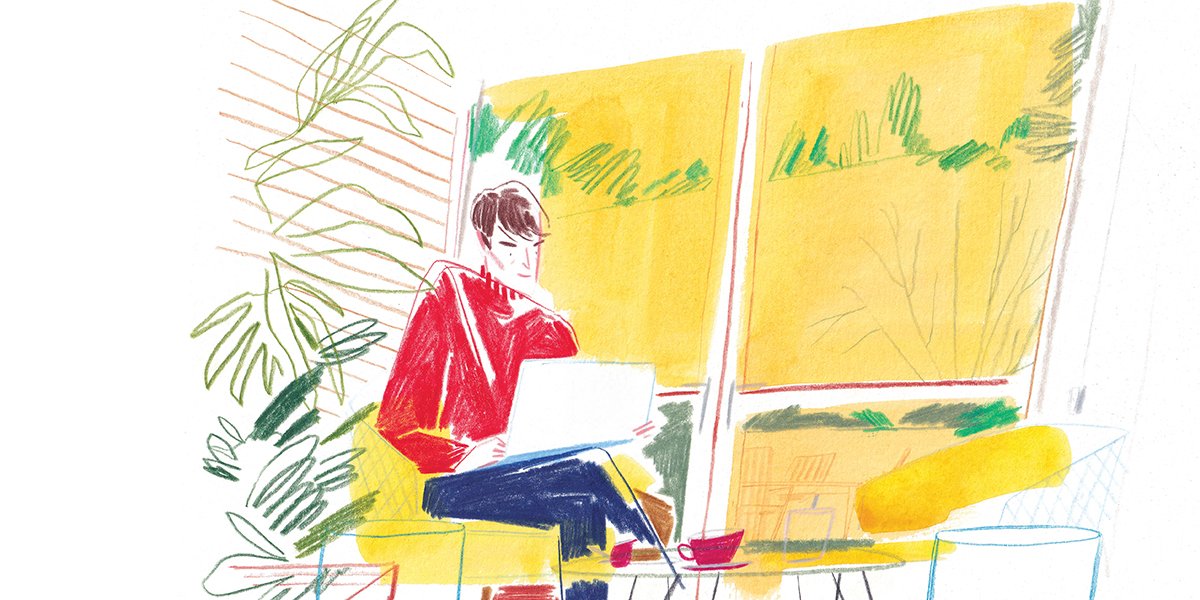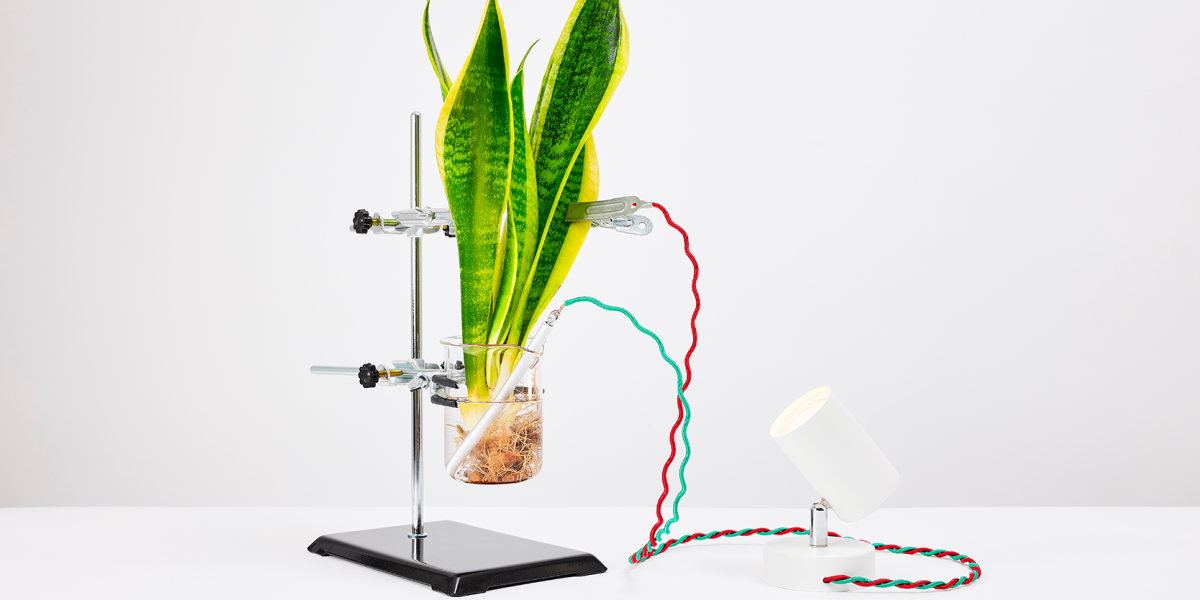The write stuff
Poems. Plays. Short stories. Novels, all sorts. Whether published in The Mays, on stage at the ADC or entered for one of the many College prizes, student writing in Cambridge fizzes with energy and experimentation. How could we resist?
When Joe Wright arrived at Magdalene to study English two years ago, he was surprised to find there was no poetry society in a College with such a rich literary history. So he founded his own. “I had no real objective in mind, and thought about three people would turn up,” he remembers.
“I spent most of my first year wandering around asking people: ‘Do you want to come to a poetry society?’”
Since then, the Magdalene Poetry Society has grown to the point that Wright is now booking guest speakers – the most recent being Katrina Porteous, whose latest collection has just been shortlisted for the TS Eliot Prize – and holding weekly gatherings.
Wright says there is something magical about sitting in the Great Hall at Magdalene, listening to each other’s work. Someone might have scribbled a joke poem 10 minutes earlier; another might bring an experimental work they’ve been perfecting for months. Everyone is welcome, no matter how much writing they’ve done, and nobody ever quite knows what turn the night is going to take.
“The way these poems speak to each other in the session, in ways you don’t expect, is really fun,” says Wright. “I never know where things will take us.” Of course, the Magdalene Poetry Society is just one of the many clubs, societies, publications, open-mic nights and informal groups that make up Cambridge’s writing
scene.
It’s an astonishingly rich ecosystem, deeply rooted in history – “Whenever I turn the corner in Cambridge, I feel like I’m bumping into someone else’s poem,” says Wright – and incredibly modern, with publications like The Mays and Notes showcasing the very best of new writing at the University.
In fact, being able to work on an actual, physical publication is hugely important for new writers, agree Famke Veenstra-Ashmore (Caius 2020) and English student Leo Kang (Clare, Third Year). The pair were the 2023/24 editors of The Mays – an annual anthology of the best new short stories, poetry, art and creative photography produced by students of Cambridge and Oxford, previously guest edited by an array of household names, including Kate Bush and Nick Cave, and currently edited by Sienna Black (Pembroke 2022).
The Mays is an entirely independent, student-led publication, enabling students to get experience in editing, writing, design and marketing. “I don’t know how many opportunities there are to make your own book as a student, have your name on the cover and with a proper ISBN number on the back,” says Veenstra-Ashmore. “It’s just a brilliant way of getting lots of people involved in doing an autonomous project where we have full creative oversight.” It’s also a public record of creative work with real legacy, giving editors and writers the freedom to push boundaries. “We didn’t go in with any set model of what a submission should look like, or impose a theme,” says Kang. “We were looking for pieces that spoke to us on their own terms, that were saying something new and exciting in a creative way.”

Ahana Banerji, Magdalene at The Iris Cafe, Newnham, Sidgwick Avenue
Leaving Tongues
You wrap my fingers in the leaves, wintergreen,
twisting psalms between loose teeth.
Bound, I swear to something sharp
as my father’s nose, your mother’s mouth.
You harvest my handship
before the bruising of the midrib,
as the kingfisher breaks
his bill on a bone-eared stone.
Minnows scarper upstream, no longer monarchs.
Beneath our casuarina tree, you are
deadheading asphodels. We watch
white tongues curdle by our feet.
This poem was first published in The White Review after I was shortlisted for their Poet’s Prize in 2022. “Our casuarina tree” is a reference to a poem by Toru Dutt, a Bengali poet and translator. Dutt’s poetry worked as a brilliant access point to writing about the complexities of communication.
The submissions were full of surprises: poems and stories about loss and landscape, about finding a photograph of your father in the attic.
There were jumping Frenchmen in 19th-century Maine, historical diseases, a whale in a school pond, a bone creature that eats people, and the experience of running into poetry legend Simon Armitage outside Sainsbury’s. “That’s why creative projects like this are valuable, because they surprise and unsettle us in a good way,” says Kang. “They challenge our perceptions of who we are and how we communicate that to other people.”
And, of course, publications like these can be a jumping-off point for something bigger: the writing career of Zadie Smith (King’s 1994) was launched when an agent saw her story Mrs Begum’s Son and the Private Tutor in The Mays 1997 edition. And writer Imani Thompson (Lucy Cavendish 2019) – a huge fan of Smith – had two short stories published in The Mays during her first year. “It was the first time I had seen myself in print, which was incredibly exciting,” she remembers.
Thompson, too, took inspiration from the creativity around her. “That’s one of the most amazing things about Cambridge. You are surrounded by creative people, and nobody is weird about it. I know friends who have gone to schools where they’re super creative, but it wasn’t really seen as the cool thing to do, so you’re kind of shy about it. It’s great not to feel shy, because everyone just wants to do stuff and is kind of nerdy in their keenness.”
But along with providing a place to hone her craft, Cambridge has also proved a rich source of material. In November, The Borough Press won a fiercely fought 10-way auction for Thompson’s “blistering and addictive” debut novel, Honey, to be published next year. Her protagonist Yrsa is tired: of her PhD; of the undergraduates she teaches; and of the useless men in her world. When she flicks a bee into one such man’s San Pellegrino, she has no idea what she’s starting. But that one half-accidental murder awakens a taste for more – and suddenly Yrsa is alive. “My agent wanted more Cambridge!” says Thompson. “So I thought yes, let’s have Trinity College, the formals, the balls. It was a very fun setting.”
Thompson says the sense of shared creativity was instrumental in developing her craft. “Finding those spaces in the University is your lifeblood. I think if you are a creative person, you need that. You feed off that so, so much. And it feeds your academic work as well, because it enables your brain to work in more fluid, non-structured ways.”
Sara Collins’s bestselling debut novel, The Confessions of Frannie Langton, has had the kind of success most writers can only dream of. It won the 2019 Costa First Novel Award, and Collins adapted it for TV in 2022 – “a rich, compelling story that keeps tight hold of its plot,” said Lucy Mangan in The Guardian. But it was initially noticed when she submitted the first three chapters to the Lucy Cavendish Prize.
“That was hugely instrumental,” remembers Collins (Master’s in Creative Writing, ICE 2015). “My agent was a judge that year on the Prize. Following the shortlisting, she invited me to a meeting and offered me representation. The novel was only partial at that stage, and she worked with me for the next two years to finish it, giving excellent editorial feedback. We submitted it in 2018 and got a publishing contract with Viking after some quite competitive offers.”
But along with nurturing writers aiming for commercial success, the Cambridge scene also welcomes the experimental. “It allows writers the freedom to push the boundaries – and that’s important,” says English student Ahana Banerji (Magdalene, Third Year), already an award-winning poet.
Notes is fundamentally just a weird little zine, but one of the reasons it’s managed to maintain itself for so long is because people are interested in the weirdness. One of the founders said that they always wanted to look at ‘weird form with a capital F’. I don’t know what that means! But it’s quite nice to not know what that means because it opens it up to people being weird with poetry. And I think poetry should be weirder a lot of the time.”
Alongside the ‘weird’, of course, the environment creates some pivotal moments. “I remember a reading at Pembroke, organised by Mina Gorji, with Bhanu Kapil, Mona Arshi and Mary Jean Chan, who is the current Judith E Wilson Poetry Fellow at the Cambridge Faculty of English,” says Banerji. “It was so powerful to see three women and non-binary people of colour just completely dominate the panel. The fact that people of colour were dominating this poetry panel because they didn’t need to speak from a place of minority was an incredibly formative moment for me.”
From poetry and plays to novels and short stories, from beloved classical works to modern fiction, the Cambridge student writing scene is constantly in flux: growing, changing, thriving and, most importantly of all, inspiring.
What people would describe as ‘a scene’ is critical and is something you can carry with you throughout your career- I think the most important thing in writing – apart from discipline – is community. The support, feedback and encouragement of your peers is essential.
Joe Wright, Magdalene at The Locker, 54 King Street
Killhope Cross
He found me on Kill hope Cross,
clinging to the quivering tightrope air
in a heap by my bike and the small stone cross
stuck squat in the verge, like the hook
of a line between the unimaginable
space above, and the docile fells
rolling out below. He pulled up
and as the door opened
I nearly said I loved him. Instead
he gave me water, and a smile.
There was a few minutes of breath
-catching, we were two kites
tied to the same pivot, meeting
between gusts in that strange
hurry of things we knew were yet
to come, the contours
separating gently into valleys, wind
buffeting words along
to one year later. Untied
from each other, we crossed.
He texts me that he drives up there
sometimes. I write
these lines to pull him just a little closer.
I often cycle over the Pennines, and love thinking about maps and contours. Killhope Cross came about as I wondered how contour lines might relate to the lines of the poem – what lines keep people together. It was a joy to have it published in The Mays last year!
Leo Kang, Clare at Harvey’s Coffee House, Harvey Court, West Road
Prospectus
But mizzle, bitten thing. What’s mine is now yours. Be somehow
more moonish (there are mitigations on the milk glass). I am no
longer mincing this wet matter, this marsh pearl we once reasonably
could have called memory, long ago, and in another country.
This poem was published by the Oxford Review of Books this Spring. It was inspired by some of Denise Riley’s shorter lyrics, which feel tough and sinewy to me. I like to have fun with sound in a poem – I think meaning can emerge from a rattling around of sound!

 CAM
CAM


